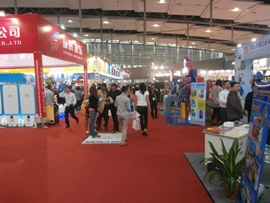The Chinese government’s policy towards amusements is stifling the sector – so said several of the exhibitors at this week's China Guangzhou International Game and Amusement Exhibition.

The event brings together companies from a host of leisure markets, the majority of which are Chinese and are based in the Guangdong province. The first day of the show, which is housed in three halls of the enormous China Import and Export Fair Pazhou Complex in Guangzhou, was particularly busy in the room dedicated to pay-to-play amusements.
Although the majority of major names in video and redemption games chose this week to exhibit at the Panyu Animation and Game Expo, GAGA 2013, at the neighbouring Poly World Trade Center, the demand for kiddie rides, water-based shooters and children’s park rides saw the aisles and booths of the show consistently busy. Much of this focus on equipping family entertainment centres is attributed to the Chinese government’s support for this sector at the expense of other amusements, which, although permitted it seems, are deemed to fall within a grey area that borders gambling – an activity permitted only in Macau.
Several exhibitors InterGame spoke with referred to the government’s “unclear” policy on amusements such as redemption and skill games, claiming that while this uncertainty remains, other markets in south-east Asia are more stable. While this has meant strong growth for those supplying equipment to FECs, others – including some of the larger Japanese companies – are unwilling to dive head first into the Chinese market, despite its potential. Coupled with the ease and speed with which the less scrupulous domestic manufacturers are able to bring copied machines to market, the lack of clearly defined regulation makes China an uneasy balancing act for some. That being said, one exhibitor estimated that the market sees 100,000 machines sold annually despite the current situation and predicted that the number of FECs could quite easily double in the next few years as regional towns grow to become cities in their own right.
Should government officials be moved to clarify exactly what they deem to be appropriate and what they see fit to prohibit, it is argued, companies could at least be certain of what they can bring to what is undoubtedly one of the most significant markets in the world.

